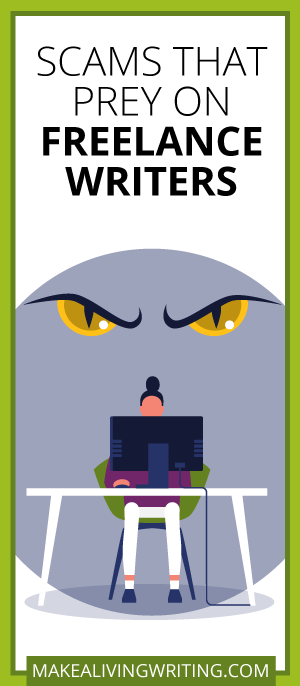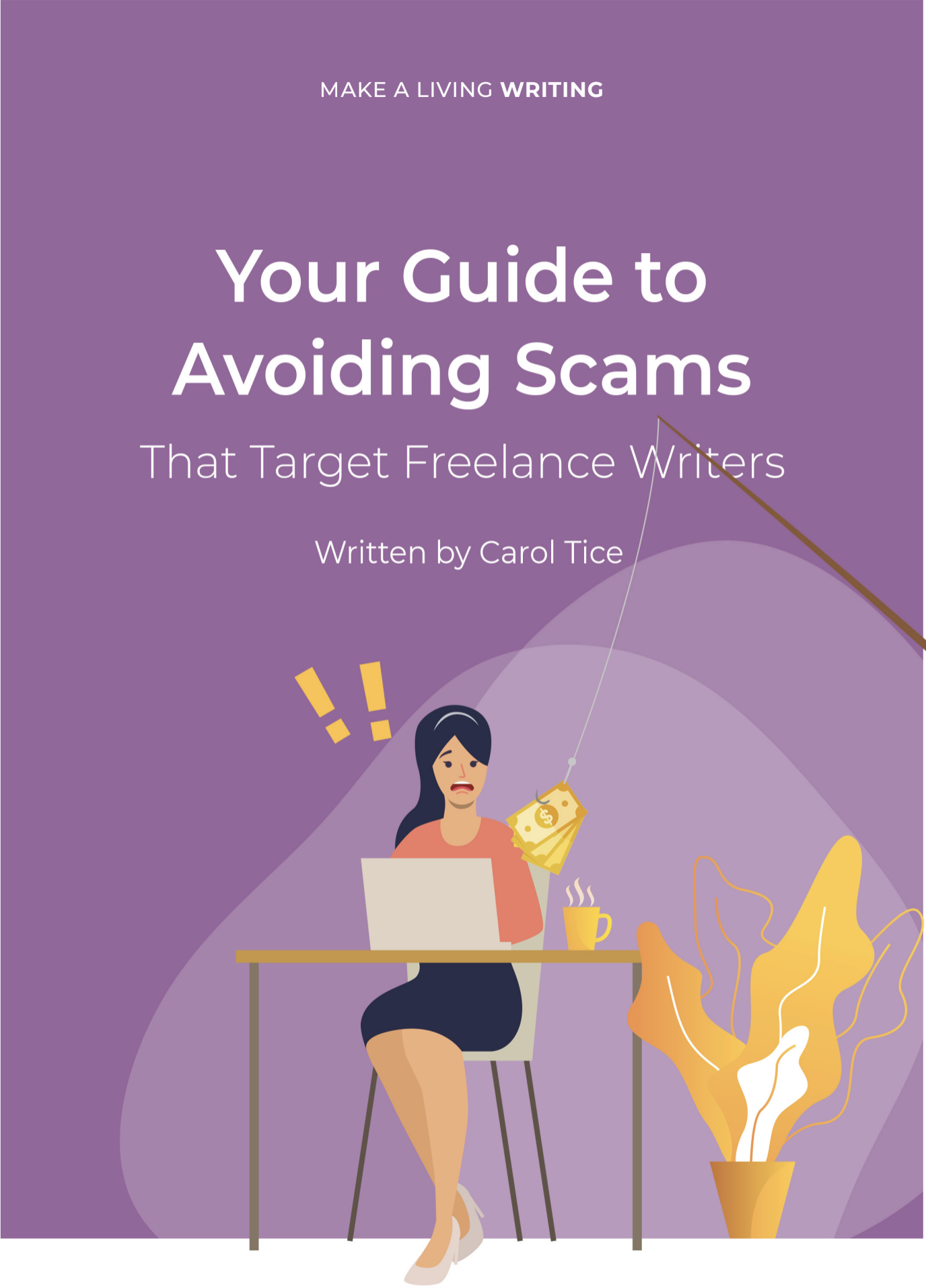
Click here. Pay now. Limited-time offer. Get exclusive access. You probably already know the buzzwords.
Some of these might be legit opportunities for freelance writers, but many aren’t.
In fact, there’s an entire underworld of scammers out there preying on broke and desperate freelance writers.
Ever been scammed by a client or fell for a get-rich-quick writing opportunity?
It’s a painful experience that can take a toll on your bank account, creative energy, and self-confidence as a freelance writer.
And it doesn’t have to be that way, says Federal Trade Commission Consumer Education Specialist Lisa Lake.
“Nobody can guarantee that you’ll make money,” says Lake. “Promises to make quick and easy money are always lies. Stop whenever someone pressures you to buy. That’s a very strong sign of a scam.”
So what are the top scams targeting freelance writers in 2020? Here’s what to watch for:
In this post, we’ll cover common ways freelance writers get ripped off online. For the full list (Top 10), download this free e-book, where we also include your Scam Fighting Toolkit.

Advice for freelance writers from the FTC
Did you know the Federal Trade Commission regularly investigates online scams targeting freelance writers, entrepreneurs, and people looking for ways to work from home?
- Here’s an example: Last month the FTC ended a legal battle with two work-from-home scammers by issuing an $11.3 million judgment against Jason Brailow and Brandon Harshbarger. The FTC also banned them from marketing or selling work-from-home opportunities for life. Their $97 offer was junk, but got more than 50,000 people to buy in and pay for additional services.
Last year the FTC also busted work-from home scams of the multi-level-marketing variety, business coaching, job placement scams, and more.
Beware of get-rich-quick scams
“With a business opportunity scam, what we see is typically a promise,” says FTC Associate Director Lois Greisman. “You’ll make money. You’ll make a lot of money.”
But when the FTC and law enforcement investigate work-from-home scams, there’s usually no trained coaches, no proven programs, and no one who’s achieved the success they’re selling, says Greisman.
Freelance writers: How to avoid a scam
If you’re thinking like a broke and desperate freelance writer, you’re already a target for a scam.
Maybe you’re a newbie. Maybe you just lost a big client. Or maybe you’re trying to level up, but you’re not sure where to find better paying clients.
Before you fork over your credit card number for a freelance writing opportunity, there’s a few things you should do, says Greisman:
- Research online. Before you spend a dime, research the company online. Do some kind of a search with the word complaint, scam, or review.
- Contact the Better Business Bureau to find out if there are any complaints against the company.
- Contact your state attorney general’s office, to find out if others in your state have been scammed or if the company is being investigated for fraudulent practices.
- Ask people in your network if they know anything about the company and opportunity.
- And if it sounds too good to be true, it almost always is.
Red flags, rip offs, and freelance writing scams
When you’re new to freelance writing, it’s hard to see some of the pitfalls, flashing like big neon signs.
For example, maybe you’re considering an offer based on a well-designed website and smart messaging. But there’s a red flag…spelling errors, over-punctuated sentences, or run-on sentences so massive your eyes start to twitch. Beware!
Some scams targeting freelance take a stealthier approach, but one thing is certain…Knowing how to spot a scam can save you a lot of trouble, time and money.
Watch out for these top 5 freelance writing scams:
1. ‘Wonderful’ work-from-home opportunities
The work-from-home scam is probably the most common scam around targeting freelance writers.
It usually involves a fake or questionable company and sometimes a Google Hangouts interview. This imposter promises massive earning potential and job viability by writing:
- Resumes
- Academic papers
- Product descriptions
- Amazon reviews
- SEO-keyword-stuffed blog posts
- Niche sites filled with content you can sell
TIP: You’re not going to make a living writing with this type of work. The best way to avoid this scam is to do your homework. Roll up your sleeves and investigate it yourself. If you’re uncertain about the website information, search for the company on LinkedIn or elsewhere. Or call the company to verify the legitimacy of the opportunity.
2. Fake writing platforms
Fake freelancing platforms are out there. So, writers beware. That writing platform might have a slick design. But to get access to resources, coaching, training, and exclusive jobs, you’ll usually pay to play. And once you’re in, you might have a hard time canceling.
TIP: Always check a website’s authenticity. A website worth its weight should at least provide an About page and some general contact information. Call the number. Send an email. Check social pages. Go the extra step and check out consumer review sites and the Better Business Bureau. If there are complaints galore, you’re sure to find them before you get scammed.
3. ‘Experts’ with no experience
No one wants to learn how to make a living writing from a novice, nor should you. Yet, every day more charlatans show up targeting freelance writers, even though they may have little to no experience.
Now, don’t get me wrong. Even a novice has something valuable to share with those less experienced, but you can’t teach others how to jump the bigger hurdles if you’ve never jumped them yourself. That’s common sense.
It’d be comparable to asking a first-year medical student who’s never experienced clinical rotation to teach you how to perform a successful open heart surgery. It’s not gonna happen.
TIP: Don’t buy into these “expert” products or services without properly vetting them first. Look for professional portfolios and LinkedIn profiles to start.
4. Dirty link-building opportunities
Few things are more irritating than someone approaching you for link-building using your own resources. These scammers are looking to build their audience or wealth off of your back, using your resources.
The idea is for you to post to your blog and backlink to their website. Or, worse, you publish an article to a high-end publisher – think Forbes, Inc, Entrepreneur or others, and link back to the scammer’s website.
Let me think about this. Um, no.
TIP: Getting paid for links might sound appealing, but writers beware. It’s bad SEO, and could ruin your online reputation for a very long time. Also, publishing an article to a high-traffic publisher with paid backlinks goes against most submission guidelines and can get you blacklisted. It’s better to avoid paid links scams altogether than risk your reputation.
5. Fake job posts
Fake job posts can eat up a lot of your time and resources. Craigslist seems to be notorious for them. That doesn’t mean that every single Craigslist ad is a scam.
But there are certainly quite a few out there, and this isn’t the only place you’ll find them. You’ll even find fake writing jobs and scammers on highly-reputable job sites.
Who knows what the scammers are thinking by publishing fake jobs? Most likely, it’s a way to get your email address, phone number, and contact info to sell you something.
TIP: Fake job posts all have one thing in common, though. If they sound too good to be true, they probably are, and it’s time to move on.
6. Free or low-paid writing samples
Here’s another popular scam that hits newbie freelance writers the hardest.
- The offer: Write for free. Then we’ll select the best writers for ongoing work.
It’s tempting when you’re a newbie and a potential client offers you a contract, but wants a free sample first. It’s even more tempting when you don’t have a portfolio yet.
The problem is that you’re dedicating time and energy into writing something that the scammer will use for free. In most cases, nobody actually gets hired. The scammer just gets 100-plus blog posts for free to drive traffic to their site.
And if you are among the “elite” to get hired, it’s usually a low-ball figure, like $20 for 1,000 words. Sign me up, right?
TIP: Any serious client looking for a sample can view your portfolio. If you don’t have one, then they should pay you a decent one-off fee for the piece. If they’re unwilling to do this, you might consider writing a pro bono piece in exchange for referrals. Otherwise, it’s not worth your time.
Avoid freelance writing scams…find your own clients
Knowing which red flags to look for will keep your freelance writing career moving in the right direction. Remember, when it doubt, check it out. Break away from the scams and look for legit work, instead.
Finding your own clients is always going to be be a better way to move up and earn more, than counting on a scammer to do it for you.
Have a tip for freelance writers to avoid getting scammed? Share in the comments below.
Beth Casey is a B2B writer living in Maine. She writes about business, digital marketing, health, and technology.











